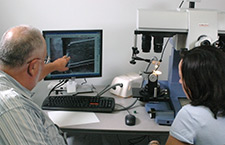Home | Glossary | Resources | Help | Contact Us | Course Map
Aviso de archivo
Esta es una página de archivo que ya no se actualiza. Puede contener información desactualizada y es posible que los enlaces ya no funcionen como se pretendía originalmente.
Roles and Expectations
In order for the trainee to be successful in his or her training, it is important that both the trainee and the trainer understand their roles in this training program and that their expectations are reasonable and managed appropriately.
Trainer
This knowledge base complements the training materials available from AFTE. Theoretically, a suitably qualified, motivated student could work through this knowledge base material with minimal support and at a self-determined rate. In practice, an agreed-upon training plan allows the trainer to coordinate the practical application of the program according to laboratory guidelines and to meet the individual needs of the trainee.
The program incorporates guidelines for the development of individual training plans and completion of competency records. The trainer must meet with the student and develop a binding individual training plan with target dates for completion. The trainer is responsible for monitoring the students progress through each phase of the plan, proctoring the tests, and completing the competency records.
The training plan example (for Modules 1-7) has underscored spaces for sections, practicals, and assignments to be entered for each module to be completed. The forms may be customized for either firearms (FA), toolmarks (TM), or gunshot residue (RD).
The practical aspects of the training are intended to be delivered using the individual laboratorys training materials and/or training materials available from AFTE.
Delivery of the practical training component may be achieved in several ways, for example by
- the individual laboratory,
- regional cooperation of several laboratories,
- partnership with a local training institution.
The laboratorys standard operating procedures (SOPs) should be used for practical exercises and for any discussions held with the student arising from the training.
It is recommended that the trainer do the following:
- Read the content (Modules 1 through 14) and become familiar with the program.
- Identify the specific modules and other parts of the program to be included in the students individual training plan.
- Identify the order in which the training should be completed (e.g., toolmark examination before or after firearm examination).
- Identify the delivery method for the practical exercises.
- Write the individual training plan with the student. Make sure that the plan documents specific dates for completion of each module and corresponding practical exercises.
- Work through each module in detail ahead of the student. This is important in order to provide the required depth of awareness of the content to prepare for questions that the student(s) may ask.
- Administer the test at the end of the module.
- Document successful completion in the competency record (this is the only formal record required to be retained).
- If the student did not pass, develop a remediation program (no entry is required in the competency record).
Trainee
This program requires that the trainer and trainee develop a binding training plan with realistic target dates for completion of theory and practical components. The practical component will be set up by the laboratory, either using its facility or through cooperation with another agency, such as a local college or regional laboratory.
Core modules in the training program component require an assessment. The assessments are usually in the form of multiple choice questions. They are constructed and administered such that the questions and the student responses are confidential.
Upon completion of the program, the trainee will have the following:
- Knowledge base to complement the skills and abilities required by the existing AFTE training materials and requirements
- Competency record that meets the requirements of accrediting bodies
Additional Online Courses
- What Every First Responding Officer Should Know About DNA Evidence
- Collecting DNA Evidence at Property Crime Scenes
- DNA – A Prosecutor’s Practice Notebook
- Crime Scene and DNA Basics
- Laboratory Safety Programs
- DNA Amplification
- Population Genetics and Statistics
- Non-STR DNA Markers: SNPs, Y-STRs, LCN and mtDNA
- Firearms Examiner Training
- Forensic DNA Education for Law Enforcement Decisionmakers
- What Every Investigator and Evidence Technician Should Know About DNA Evidence
- Principles of Forensic DNA for Officers of the Court
- Law 101: Legal Guide for the Forensic Expert
- Laboratory Orientation and Testing of Body Fluids and Tissues
- DNA Extraction and Quantitation
- STR Data Analysis and Interpretation
- Communication Skills, Report Writing, and Courtroom Testimony
- Español for Law Enforcement
- Amplified DNA Product Separation for Forensic Analysts


